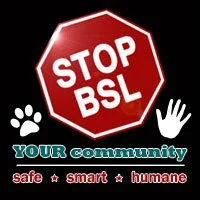BSL: JUST SAY NO

Dog attacks and violence are serious concerns for many individuals and communities across the globe. Due to these issues, many rules have been put into effect in an attempt to promote safety. However, some of these laws, such as Breed-Specific Laws, end up doing more harm than good. Breed-Specific Legislation (BSL) is a term used to encompass laws that regulate and/or ban specific dog breeds to attempt to decrease dog attacks. The majority of the breeds that are affected by these laws are the “Pit Bull” class of dogs; however, many of these laws additionally encompass the stereotypically “mean” breeds, such as Bulldogs, Rottweilers, Mastiffs, Dalmatians, Chow Chows, German Shepherds, and Doberman Pinschers.
The idea of Breed-Specific Legislation has spread across the globe, manifesting in forty-one countries worldwide. Some of these countries include Canada, the United Kingdom, Germany, France, Australia, and of course, the United States. In the United States alone, 937 cities and thirty-six out of the fifty states have Breed-Specific Laws. One of these states is South Carolina, where every single BSL can be classified as a Pit Bull Ordinance. In Beaufort County, it is mandatory for all Pit Bulls to be sterilized; in the city of Dillon, Pit Bulls have been officially declared “dangerous;” and in the city of Travelers Rest, Pit Bulls, Rottweilers, Doberman Pinschers, and Chow Chows have officially been declared as “vicious.” There are no such laws in Charleston and Mount Pleasant; however, this doesn’t mean that there aren’t certain biases against certain breeds of dogs.
In mid-August, Seaside Farms informed Nancy Butler, a resident in the community, that they had been informed that she has a “Pit Bull dog,” which are not allowed in the community. Due to these rules, she was told that if she didn’t remove her dog, she would face fines and possible legal action. Nancy was taken aback by this request for a multitude of reasons. First, Bee, her dog, had never caused any problems in or outside the community. Second, “Pit Bull” is not a breed of dog, meaning that the community cannot ban a “Pit Bull dog.”
If these laws are believed to help so many people and communities, then why is there so much controversy surrounding the subject? Much of this is due to the numerous consequences that come alongside BSL. The first of these is the inevitable suffering of the dogs involved. In order to skirt around these laws and keep their pets, many dog owners will restrict their dogs outdoor time and neglect proper veterinary care such as licensing, microchipping, and sterilization. Additionally, owners suffer. Many would rather face housing issues or legal fees rather than give up their beloved dog.
All of the controversy surrounding this topic leads to one question: is Breed-Specific Legislation even effective? According to the ASPCA, there is no evidence that these laws make communities safer for people or even animals. The Center for Disease Control and Prevention (CDC) even opposes BSL. They noted some of the issues with this form of legislation to be the inaccuracy of dog bite data, the difficulty in identifying dog breeds, its high expenses, and its difficulty to enforce.
If Breed-Specific Legislation isn’t effective, then we should be looking towards alternatives that promote safety for individuals and the community. Despite there being no evidence that BSL is effective, there is evidence that Breed-Neutral Laws, meaning laws that encompass all dogs regardless of breed, are effective. Breed-Neutral Laws include increased availability to affordable sterilization, graduated penalties for individual “dangerous” dogs, laws that hold dog owners financially accountable for their failure to follow to animal control laws, laws that hold dog owners civilly and criminally liable for unjustified injuries or damage caused by their “dangerous” dogs, and laws that prohibit chaining, tethering and unreasonable confinement of dogs. If laws such as these, concerning individual dogs, dog owners, and situations, are put into place as opposed to Breed-Specific Legislation, the globe will become a happier and safer place for dogs, dog owners, and their entire communities.
Written by Jessica Harrell




